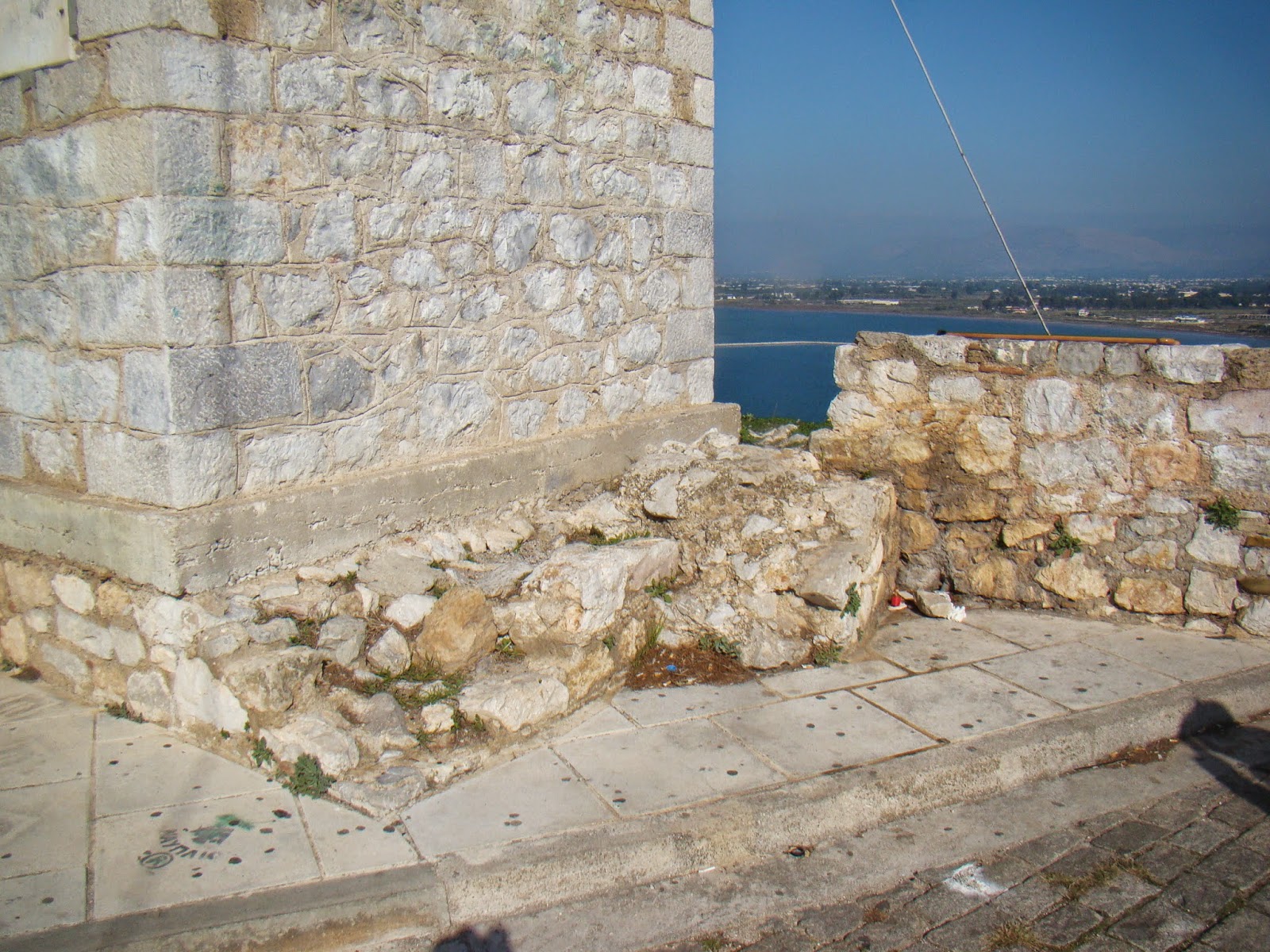The
Castle of the Franks, Grimani map ca. 1712.
Wall
and tower shown below directly in the center.
The
Greek Archaeological Service has after many years taken up work again
on Akro-Nauplion with large projects in the Castle of the Franks. In
November, thanks to Ioanna Christoforaki, I was shown over the sites by archaologist Natassa Basileiou
and two of her colleagues. It could not have been a more inconvenient day for them because of organizational changes, but they were generous with their time and humor and information, and it is a great pleasure to know that these are the people who are the future of the Archaeological Service.
Archaeologists
Eirini Oikonomopoulou,
Kostis Boundouris,and Anastasia
Basileiou.
Visitors
to Akro-Nauplion have a certain familiarity with the great merloned
Venetian cross-wall built in 1470 during the Venetian-Ottoman War
because there the road is forced to turn abruptly right and go
through a narrow bend to gain access to the bell tower and then the
hotel further down. Up on the hill behind this Venetian wall is a
cross-wall with a large square tower in the center built by the Franks probably 250 years earlier to defend against Greek Nauplion. The Archaeological Service has
uncovered the remains of the square tower, and has identified remains
of the cross-wall at the bell tower.
The
Castle of the Franks, Francis Schaefer, 1936.
Cross-wall and tower, left; central tower with frescoes, right.
Bell tower, top left.
Cross-wall and tower, left; central tower with frescoes, right.
Bell tower, top left.
Remains
of square Frankish tower.
End
of Frankish cross-wall at bell tower.
Inner
entrance to tower with frescos.
As part of the restoration project for the tower, the interior fill deposited over the centuries has been removed, and the inner approach to the tower cleared down to the base. I did not ask where Schaefer had found the child sacrifice but it was much on my mind.
View
of frescoed chamber with Angel barely visible above
on plaster
over arch of Roman brick.
When
Francis Schaefer saw the tower frescos in 1956, he thought them in
good-enough condition so as to need no restoration work. When I saw
them first in 1977 – knowing only that they were
“Frankish” – I could make out almost no details. That winter the tower chamber was sealed and the subsequent
deterioration was rapid. In the last two years they have been
restored to the extent possible -- and the photo above shows how very pale they are now. None have the color or show
the marvelous detail of the small Angel of the Ascension on the
overhead arch.
The photographs below that I was able to take are underwhelming, but they have been much brightened and the colors intensified with Gimp. The identifications are those made by Francis Schaefer. The frescos are dated between 1291 and 1311, and were probably created by Greek painters for Frankish employers.
Ornamentation shown on right of previous photograph.
Warrior before Gimp.
Warrior after Gimp.
St. Anthony.
Bishop.
Saint.
Some
information thanks to Monika Hirschbischler, “The Crusader
Paintings in the Frankish Gate at Nauplia, Greece,” in Gesta
XLVI/1 (2005) 13-30.
.jpg)
.JPG)

.JPG)



.JPG)

.JPG)
.JPG)
.JPG)
.JPG)
It's been 25 years since I was last at Nauplion, and I have always admired the dramatic fortifications: what a treat to have a closer look. I'm glad they're paying attention to them: what a tragedy the frescoes could have faded so much in half a century having survived so long before that! So much to be learned. Love your posts!
ReplyDelete